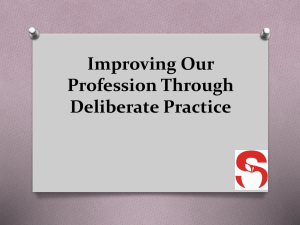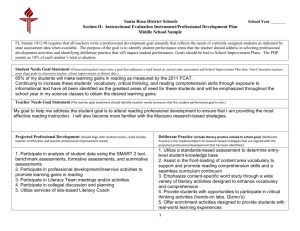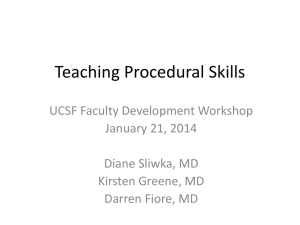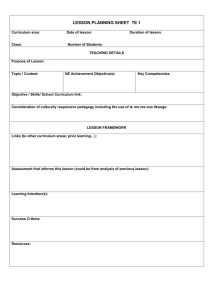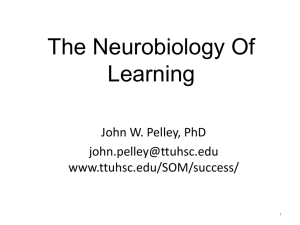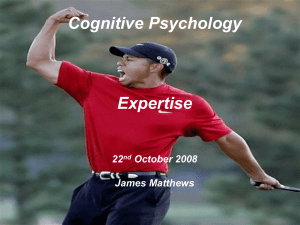Document
advertisement
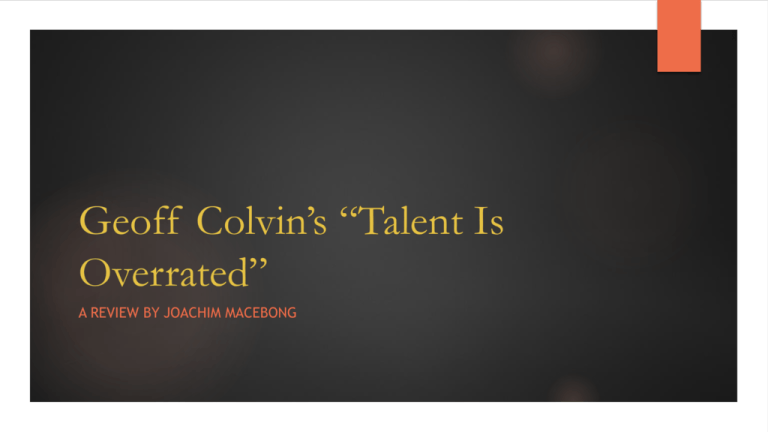
Geoff Colvin’s “Talent Is Overrated” A REVIEW BY JOACHIM MACEBONG On top of their game The question of talent We look at some of the most successful people in the world, and we know they are different from us. But why are they different? The idea of talent and leadership being innate has been around for centuries, but is this really true? The study of high performance is critical in today’s world due to rapidly rising standards in every area. As researchers have looked for evidence to link high performance to innate abilities (like intelligence and so on), they have found little of it. So, what does explain high performance? It is called ‘deliberate practice’, and its principles hold enormous potential to increase the productivity of individuals and organisations Elements of deliberate practice It is designed to improve performance High repetition Continuous feedback Demanding mentally (several hours a day, with breaks) Not a lot of fun Aim for your learning zone Comfort zone Learning zone Panic zone Effects of deliberate practice Superior perception Superior knowledge Superior memory Models of deliberate practice Music model (presentations, speeches, job evaluations, interviews, etc) Analyse the text and determine the most important idea to be conveyed Work on each section repeatedly, striving to express yourself more effectively Feedback after each repetition either from a coach or from watching video. Models of deliberate practice Chess model Case method, organized under themes Used in business schools, and can be focused on specific areas that need improvement The key question is: ‘What would you do?’ Feedback can be gotten from classroom interactions and the real-life actions of the subjects Models of deliberate practice Sports model General conditioning (basics, basics, basics) Specific skill development through simulations, etc Further opportunities for deliberate practice Before the work (setting specific goals, thinking about the process for reaching those goals) Self observation Post mortem Actively deepening your knowledge about your field Lessons for teams and organisations Jobs should be tailored in a way that stretches the individual Encourage leaders to be active in their communities Understand the role of teachers and of frequent and accurate feedback (coaching and mentoring programs) Catch them young Inspiration over authority (We were made to do big things!) Developing people for leadership should be a way of a life, a cornerstone of the organisation. Develop teams, not just individuals Chemistry and culture are key Encouraging innovation in organisations Deepening knowledge of the field helps spur innovation Innovation comes in an incremental fashion A management that encourages an atmosphere of innovation Deliberate practice has benefits in youth and old age Knowledge is the foundation of great performance, and the earlier the acquisition of this knowledge starts, the better. A supportive environment at home is a key factor in exceptional performance Deliberate practice can help stave off the effects of age in one’s chosen field Where does the drive for excellence come from? Intrinsic and extrinsic motivation: Which is more effective? Colvin cites research which says that only intrinsic motivation enables to persist through the demands of high achievement over many years This brings us to the topic of JOY! Only a joyful disposition can sustain you through the ups and downs of attaining excellence THANK YOU
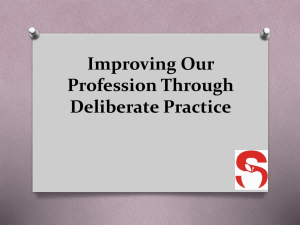
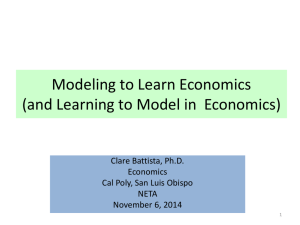
![Dr Paul Russel, Defence, Science and Technology Laboratory [PPTX 2.68MB]](http://s2.studylib.net/store/data/015100066_1-1b102811898274b674f865c25f5a0087-300x300.png)
